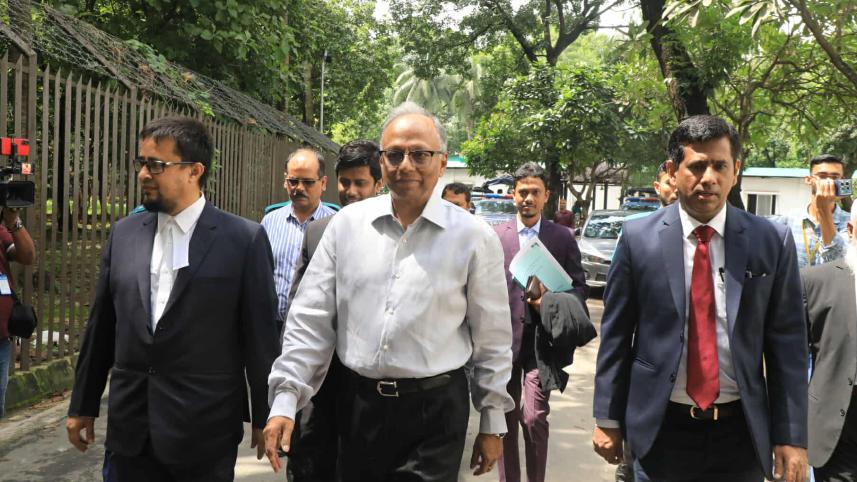‘Foreign power backed Hasina’s fascist regime’

Amar Desh Editor Mahmudur Rahman yesterday told the International Crimes Tribunal-1 that deposed prime minister Sheikh Hasina, with foreign backing, established a "fascist regime" in Bangladesh by weakening the army, undermining the judiciary and suppressing political opposition.
Testifying as a prosecution witness in the crimes against humanity case against Hasina and two others, Mahmudur introduced himself as a journalist, writer and researcher. He said he had observed the rise and fall of "one of the worst rulers in Bangladesh's history", culminating in last year's uprising.
He argued that Hasina's regime was sustained by collaborators in the army, DGFI, judiciary, police, Election Commission and media. "The fascist rule was established through meticulous planning, with direct involvement of certain Bangladeshi politicians and a foreign power."
The tribunal has so far heard 46 witnesses.
During lunch break, Chief Prosecutor Tajul Islam said Nahid Islam, a key leader of the July uprising, will testify today. "We think sufficient evidence has been presented … We'll then move for closing arguments."
Mahmudur said Hasina's first move was to weaken the army. "Two months into her tenure, the BDR massacre was orchestrated with Sheikh family members -- particularly former MP Sheikh Taposh -- involved. Fifty-seven army officers were murdered and their families tortured, yet Taposh was never tried."
He alleged that "10 months before the December 2008 election, the results were predetermined in Delhi" and accused a top army official and a DGFI officer of engineering the Awami League's landslide.
Hasina and her ministers failed to protect officers and allowed the Pilkhana massacre to continue, he said, adding that the hostility stemmed from "Hasina's father's reliance on the Rakkhi Bahini over the army".
Hasina then turned to the judiciary, Mahmudur claimed, citing Khaleda Zia's eviction from her cantonment house -- which Hasina later admitted was a political decision -- and the abolition of the caretaker government system.
Although most amici curiae (neutral experts invited to advise the court) and several Appellate Division judges supported retaining the caretaker system, four justices ruled otherwise and were later rewarded as chief justices, he alleged. "Through such moves, independent justice was destroyed, democracy abolished and the courts turned into instruments of fascist rule."
He said the 2013 Shahbagh protests were staged to create a "public enemy concept" targeting Islamic parties, comparing the strategy to Hitler's demonisation of communists and Jews.
"The Ganajagaran Mancha functioned as the second parliament," he said, alleging civil servants were pressured to endorse executions while Hasina declared she was "always at Shahbagh in spirit".
"This paved the way for retrospective legal changes that turned Abdul Quader Mollah's life term into a death sentence -- a historic injustice."
Mahmudur alleged that on May 5, 2013, security forces carried out a mass killing of Hefazat-e-Islam members at Shapla Chattar, naming top officials of police, Rab and BGB as responsible. They were later promoted and no trial was held.
He recalled the 2012 "Skype scandal", which exposed alleged collusion between the tribunal chairman, a Belgium-based Bangladeshi, and prosecutors in drafting verdicts.
He accused Hasina of staging three "farcical" elections: in 2014, when 153 MPs were elected uncontested; in 2018, when ballots were stuffed the night before; and in 2024, mocked as the "me and my dummy's votes" election.
Mahmudur recounted how he was detained, tortured and mentally abused in Rab's "Ayna Ghar", Cantonment Police Station and DB custody, where he was kept on remand for 39 days. He said he witnessed severe torture of Islami Chhatra Shibir president Delwar Hossain in DB custody in 2013.
He further accused the regime of staging militant dramas to impress foreign powers, citing the 2016 Kalyanpur operation where "poor villagers were framed as militants and killed in fake encounters."
Mahmudur named six former chief justices, three appellate judges, 10 lawyers including two ex-law ministers, 12 senior police officials including five former IGPs, three election commissions (except Mahbub Talukdar's), 16 political leaders and 13 senior army and DGFI officials, including four former army chiefs, as aiding Hasina's consolidation of power.
He alleged that India played a decisive role in Hasina's rise, citing New Delhi's pressure before the 2014 polls, when a top diplomat pushed the Jatiya Party to contest. Even after the "fake elections" of 2018 and 2024, India allegedly lobbied in Washington and Europe to support Hasina.
Mahmudur's testimony will be cross examined by the state appointed defense counsel today.



 For all latest news, follow The Daily Star's Google News channel.
For all latest news, follow The Daily Star's Google News channel.
Comments